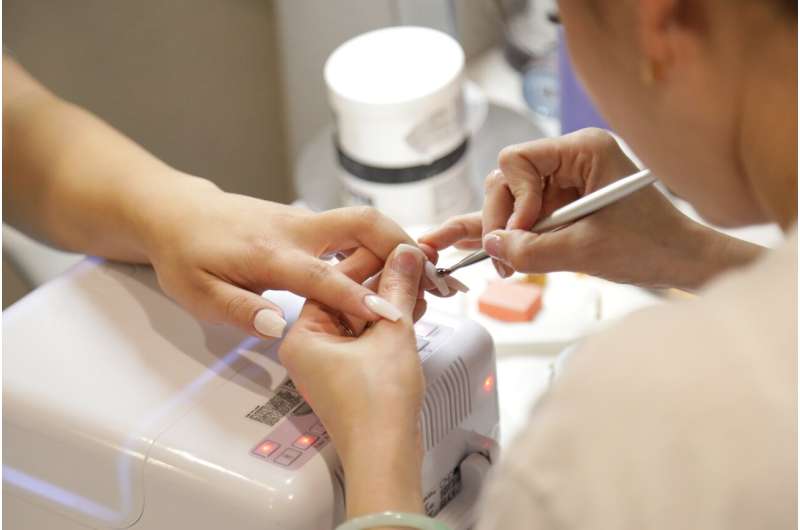This article has been reviewed according to Science X's editorial process and policies. Editors have highlighted the following attributes while ensuring the content's credibility:
fact-checked
trusted source
proofread
Nail salon and other small beauty service workers face significant daily health challenges

The beauty service microbusiness industry in the United States—such as the small, independently-owned nail salons found across the country—is huge, with more than $62 billion in annual sales.
However, most of the workers who provide these highly sought services are Asian female immigrants who earn very low wages. These workers face numerous workplace health challenges stemming from the chemicals they use, repetitive movements with handheld tools and awkward body posturing.
They also are reluctant to bring attention to these conditions due to factors such as possible immigration-related trauma, lack of English proficiency, fear of losing their jobs and unfamiliarity with American culture and business practices.
A new commentary led by Dr. Aurora Le, associate professor with the Texas A&M University School of Public Health, offers multi-layered insight into the complex challenges these beauty service workers face, as well as suggestions for interventions and policy measures to address them.
For this assessment, Le and a colleague from the University of Minnesota used a research framework that depicts how behavior, the physical/built environment, sociocultural environment, and health care system interact with factors at the individual, interpersonal, community and society level to influence the health of individuals and populations.
"This structure not only helps us understand how these multilayered issues affect each other, but also helps us shape and prioritize strategies to address health issues and disparities through organizations, communities and policies," Le said.
For example, where the behavioral domain intersects with the interpersonal level of influence for Asian and Asian American beauty service workers, the researchers identified a lack of occupational health services and training, of employment-related benefits and low wages, and of other workplace health promotion benefits.
"This means that outreach and education at the individual level about occupational safety and health would require cultural competency and communication that includes materials not only in their language, but also at their literacy level," Le said. "The same would be true at the interpersonal level, which includes social interactions in the home and work environment, as well as larger social networks."
At the community level, the resources available for these workers vary significantly by geographic location, with cities that have more immigrants from a particular country having more in-language resources.
"Still, it's the case that most of these resources pertain to services such as how to enroll in and access health care, how to get legal help, and so on," Le said. "Materials about occupational safety and health are extremely limited, especially for microbusinesses."
Within the larger society level, which includes state-specific licensure and health department regulations, many beauty service microbusiness owners may lack a thorough understanding of the regulations and so might not be in compliance.
"It's also the case that most of these businesses have fewer than 10 employees and thus are subject to fewer regulations, but also operate under razor-thin profit margins and struggle to survive," Le said. "In addition, immigrant employees with little job security are much less likely to report unsafe practices."
Making change
How can these findings inform future occupational safety and health policies and practices?
"For one thing, it's clear that little could be accomplished at the individual level for these beauty service workers," Le said. "Instead, change will require collaboration by stakeholders who are invested in the community's health and experts in areas such as business development who understand the context in which these workers operate. That means that training at the very minimum must be available in the workers' preferred language, and that these employers need to gain buy-in on the importance of workplace health and safety."
At the community level, Le said community-based organizations for Asians and Asian Americans were at the forefront for these workers during the COVID-19 years, and now offer more resources on occupational safety and health issues. One example is the Vietnamese American nonprofit Boat People SOS, which has added programming on chemical exposures for nail salon workers to its training.
At the larger society/policy level, the federal government has provided funding to some community-based organizations for safety outreach efforts to Asian and Asian American beauty service microbusinesses. Le said this has led some states to adopt safer practices and advocate for workplace standards for nail salons, including better wages and training and paid time off.
Finally, at the level of the occupational safety and health practitioner and researcher, Le said the best approach would be community-based participatory research, in which all parties have equal input and decision making and build on existing assets to empower participants to have greater control over their lives. Le said that bringing more Asians and Asian Americans into the field of occupational safety and health as researchers at universities and government agencies also would help greatly, as would increased collaboration between scientists, other subject matter experts and policy makers.
"These workers and employers have come to this country and made new lives for themselves," Le said. "And now, a new, multi-level focus on occupational safety and health could help them thrive."
More information: Aurora B. Lê et al, The need for a multi-level approach to occupational safety and health among Asian and Asian American beauty service workers, Journal of Occupational and Environmental Hygiene (2023). DOI: 10.1080/15459624.2023.2245447





















